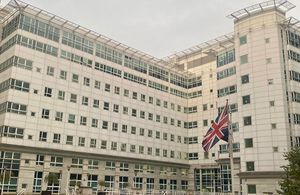Business department to bring over 400 key central government jobs to Salford by 2025
New BEIS Salford office, officially opened today, is expected to become the home of 420 business department jobs by 2025.

- 420 business department jobs will be brought to Salford by 2025, expected to increase to up to 570 by 2030
- the department’s first non-London-based Director General will be based at the new Salford site
- 1350 roles (30% of the BEIS workforce) will be outside London by 2025, going beyond the government’s existing target of 25%
The Department for Business, Energy & Industrial Strategy’s (BEIS) new Salford site has been officially opened today (28 October 2021) by Business and Energy Minister Greg Hands.
The new office is expected to become the home of 420 business department jobs by 2025, increasing to up to 570 by 2030.
The opening forms part of a wider government move to ensure policy makers work reflects the communities they serve, while making certain economic growth and job opportunities are more evenly distributed across the UK.
The Business and Energy Minister and BEIS Permanent Secretary Sarah Munby attended the formal opening of the department’s new Salford office to celebrate the unveiling of the impressive new space, as well as the appointment of the first Director General, Ben Rimmington, to be based outside of London. Mr Rimmington will be Director General, Net Zero Buildings and Industry, adopting a portfolio including heat and business energy, home and local energy and smart metering implementation.
The new office space, based on the second floor of the modern Trinity Bridge House, opened for use from 9 August 2021 and offers a host of accessible facilities having been recently refurbished.
Around 75 current BEIS staff members will be relocated by April 2023, with a further 162 new employees being recruited by the end of this year.
The move will ensure the business department, responsible for areas including clean growth and renewable energy, research and development, business growth and workers’ rights, is represented by policymakers operating across all four nations of the UK.
Business Secretary Kwasi Kwarteng said:
Salford has been instrumental in driving growth and opportunity across Greater Manchester in recent years, with its rich heritage as one of the world’s first industrial cities now reflected in its reputation as a centre for academic and business talent.
By bringing more than 400 top business and energy department roles to the area, we can take advantage of the fantastic local workforce and ensure voices in the North West are reflected in our national work to build back better from the pandemic.
The relocation will see business ministers spending an increasing amount of time outside of London, ensuring local communities feel better represented and providing new opportunities to better tailor policies to meet local needs.
These plans will allow closer collaboration between civil servants leading on green energy projects and the government’s net zero stakeholders in the North of England and will make sure policy makers are right on the frontline in the fight against climate change.
Business and Energy Minister Greg Hands said:
It’s a real pleasure to see the site first-hand and meet many of the staff who will develop and deliver our plans to combat climate change and drive clean growth, just a week after the launch of the government’s Net Zero Strategy.
Not only does it mean that civil servants will be physically closer to the heart of the action on net zero in the North, but they will also benefit from all that Salford has to offer.
The department is in the process of relocating over 800 roles to regions across the UK. The BEIS workforce is being grown in Birmingham and Cardiff, and expanded to new locations in Belfast, Edinburgh, Darlington and Salford with an ambition to build a presence in Preston in the longer term. These plans which will see a total of 1,350 department roles outside London by 2025.
Across departments, the government is planning to move 22,000 Civil Service roles out of London, and closer to communities across the country.
BEIS Civil Service roles will be shifted through natural turnover, creating jobs in regional offices as and when vacancies arise from London, meaning current staff will not be required to relocate from London unless they want to. The business department will draw on a combination of government hubs and flexible working to ensure an efficient spread of roles.